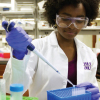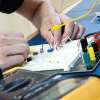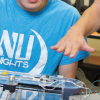Undergraduate / First-Year StudentsChoosing a Major
In your first year, you'll work with the Undergraduate Engineering Office to select an academic path and find your Northwestern direction.
Below, you can explore snapshots of the 12 undergraduate majors offered at McCormick. These snapshots will help you gain a broad understanding of what tracks are available and what you can expect from each department.
Major Snapshots
Explore each Major Snapshot to get an overview of our undergraduate departments, including:
- Programs of study
- Example courses
- How your time will be spent in the program
- Careers in the field
- Recent graduate placements

Applied Mathematics
A close-knit academic community—faculty, postdocs, and graduate and undergraduate students in the Department of Engineering Sciences and Applied Mathematics (ESAM) —works together to predict unexpected outcomes of experiments, bridge theories among disciplines, and test hypotheses not easily tested in a laboratory.

Biomedical Engineering
With cutting-edge research in neural engineering and rehabilitation, biomaterials and regenerative medicine, and imaging and biophotonics, the Department of Biomedical Engineering (BME) attracts top faculty and graduate students alike.

Chemical Engineering
The Department of Chemical and Biological Engineering (ChBE) shapes the field by tackling compelling, complex problems in energy, materials, sustainability, complex systems, global health, synthetic biology, and biotechnology.

Civil Engineering
State-of-the-art facilities, small class size, faculty-student interaction, high job placement rates, and the success of our graduates all attest to the excellence of the programs within the Department of Civil Engineering (CEE).

Computer Engineering
In close collaboration across disciplines, faculty and students in the Department of Computer Engineering (ECE) shape ideas into outcomes in all aspects of computer engineering, including digital logic, electronic circuits, computer architecture, robotics, operating systems, and parallel computing.

Computer Science
The Department of Computer Science (CS) curriculum spans all aspects of the field: operating systems, compilers, databases, networking, distributed systems, parallel systems, image-based modeling and rendering, intelligent systems for problem-solving and education, computer graphics, and theoretical computer science.

Electrical Engineering
Spanning electronic circuits, solid-state electronics, electromagnetics, optics, lasers, controls, digital signal processing, communications, and networks, the Department of Electrical and Computer Engineering (ECE) transforms bold new ideas into groundbreaking results.

Environmental Engineering
The Department of Environmental Engineering’s faculty includes internationally renowned scholars and researchers as well as clinical professors and adjunct faculty who bring extensive professional practice experience to the classroom.

Industrial Engineering
The Department of Industrial Engineering (IEMS) engages in areas such as financial and healthcare engineering and humanitarian logistics, and it teaches courses designed to develop our students’ analytic skills and understanding of business.

Manufacturing and Design
Areas of emphasis within the Manufacturing and Design Engineering Program (MADE) include sustainability, human-centered design, socially conscious entrepreneurship, and the design and development of impactful products and services. The undergraduate program focuses on three key areas: process and product design, manufacturing systems, and manufacturing management.

Materials Science
Our broad-based programs encompass a wide range of materials, enabling students in the Department of Materials Science (MatSci) to understand the scientific principles that govern the interrelationships among processing, structure, properties, and materials performance.

Mechanical Engineering
The Department of Mechanical Engineering (ME) programs focus on the core disciplines of mechanics, design, manufacturing, and systems along with essential areas of mathematics and physical sciences. Students dive into boundary-crossing topics such as nanomaterials, advanced sensing, robotics, thermal systems, and biomechanical interfaces.